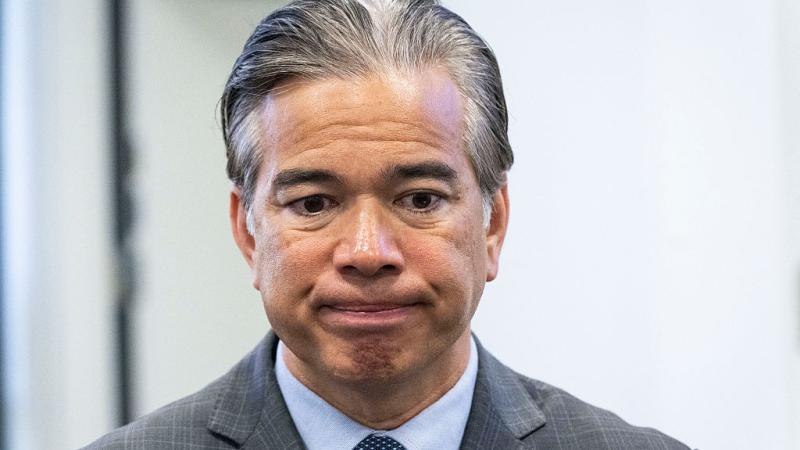GOP fights to keep House majority as election nears despite division, struggling to pass agenda
A disagreement currently going on in the GOP-majority House is funding the government using continuing resolutions. While members of the Freedom Caucus are refusing to cooperate, moderate Republicans seems willing to work on it.
With a slim majority currently in the House, Republicans are having to put up a fight in a close election as November approaches while dealing with division in their own party.
When it comes to the House, there are over three dozen competitive races and 24 races that are considered tossups, according to USA Today.
The GOP got the House majority in 2022 during the midterms but had a bit of a rocky start with the speaker's race, members retiring, former New York Rep. George Santos being ousted and disagreements on budgets and continuing resolutions.
According to Roll Call, four races are favorable to Democrats while three are favorable to become red.
Congressman Matt Rosendale, R-Mont., said during the "Just the News, No Noise" TV show that Republicans and Democrats have very different strategies on passing their agendas while making sure the more moderate members of the party still keep their seats.
"The problem is that the Democrats get together once they gain the majority, and they say, 'this is our agenda' and they pursue it and they pass it," Rosendale said. "Then they come back in and they give cover to their members that are on... what I'll say is their right flank, so a little bit more towards the moderate side."
He said the GOP does the exact opposite. "Republicans get the majority [whether] thin or not thin," Rosendale said. "It doesn't matter. They get the majority, and they immediately start saying, 'we have to give cover to our members on the left flan, because we want to grow our majority so that it's easier for us to pass our agenda.'"
A major disagreement currently going on in the GOP-majority House is funding the government and continuing resolutions with moderate Republicans being willing to pass more while members of the Freedom Caucus refuse to cooperate.
Former House Speaker Kevin McCarthy, R-Calif., was ousted last year by eight House Republicans who cited budget negotiations as the reason for ousting him.
With the new speaker, Mike Johnson, R-La., some Republicans in the Freedom Caucus are having the same issues with him that they had with McCarthy.
"I've been very vocal for quite some time that I wouldn't support a CR, but they found out that there was a lot more people that wouldn't support that CR as well," Rosendale said, referencing Johnson and other Republicans. "Again, we are mandated to use the appropriations process."
On Wednesday, Johnson punted voting on the continuing resolution and the SAVE Act due to there not being enough votes for it. A vote is likely to happen next week after Congress, "builds consensus."
Johnson is attempting to tie the SAVE Act, which is legislation that requires showing proof of citizenship to vote in U.S. elections, to the continuing resolution before the next election.
However, some Republicans including Rep. Marjorie Taylor Greene have called this move a "fake fight" while Rep. Thomas Massie called it political theater.
"Speaker Johnson is setting up a fake fight for the Save Act, which we already passed in July, to vote to extend the Biden/Harris budget," Greene wrote on the social media platform, X. "The American people are tired of being lied to. Conservatives like me actually care about reducing spending and using the power of the purse to do the right thing for the American people."
"I refuse to be a thespian in the Speaker’s failure theater," Massie posted on social media. "The 6 month continuing resolution with the SAVE Act attached is an insult to Americans’ intelligence. The CR doesn’t cut spending, and the shiny object attached to it will be dropped like a hot potato before passage."
Republicans have also disagreed with foreign aid to Ukraine with more moderate Republicans supporting it while more libertarian-leaning Republicans have opposed it.
"While Republicans are favored to flip the Senate this year, the presidential and House races both seem very close. The presidential and House races likely will break the same way, but a split decision is possible given how close the House is right now," Kyle Kondik, the managing editor of Sabato’s Crystal Ball, told Just the News in a statement.
"It would be very odd, historically, if Republicans flipped the presidency at the same time that Democrats flipped the House," he continued. "That happening at the same time in the same election – contradictory changes in party control in the White House and House – is without precedent in the modern two-party history of the United States (which dates back to right before the Civil War). That said, just because something is without modern precedent does not mean it’s impossible. Democrats winning the presidency and Republicans holding the House – a status quo outcome – would have plenty of precedent.
Several Republicans won the White House in the last century without winning the House, and as recently as 2012, the Democratic Party's Barack Obama won reelection while Republicans maintained control of the House.
















